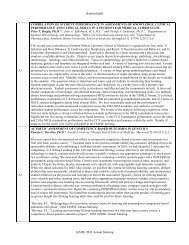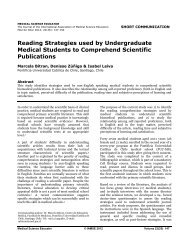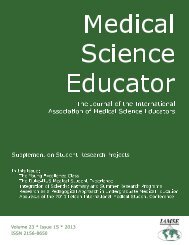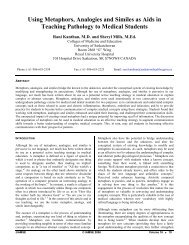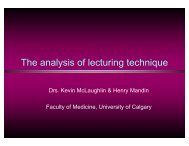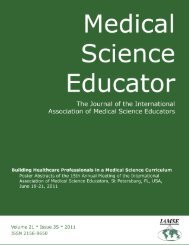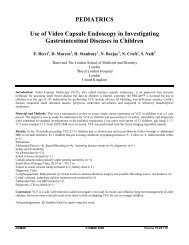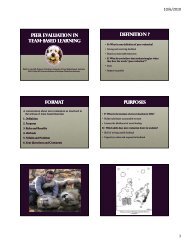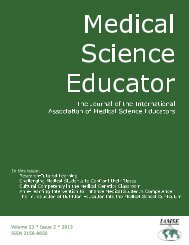Click here to view complete journal in pdf-format - IAMSE
Click here to view complete journal in pdf-format - IAMSE
Click here to view complete journal in pdf-format - IAMSE
Create successful ePaper yourself
Turn your PDF publications into a flip-book with our unique Google optimized e-Paper software.
Candidates <strong>complete</strong>d a pre and post course test<br />
assess<strong>in</strong>g any change <strong>in</strong> their knowledge. On a<br />
weekly basis course feedback forms were <strong>complete</strong>d<br />
for each station and <strong>in</strong>struc<strong>to</strong>r. In the f<strong>in</strong>al session<br />
small focus group discussions were set-up and<br />
questionnaires <strong>complete</strong>d which allowed us <strong>to</strong><br />
compare any significant change <strong>in</strong> their<br />
understand<strong>in</strong>g of learn<strong>in</strong>g ana<strong>to</strong>my and perceptions<br />
of the course.<br />
RESULTS<br />
This is a work <strong>in</strong> progress and results will be<br />
available for the conference<br />
CONCLUSIONS<br />
Available for the conference<br />
Instructional Methods Abstract ID: 192<br />
IMPLEMENTING A LEARNER CENTERED<br />
CURRICULUM USING A NOVEL<br />
EDUCATIONAL STRATEGY IN THE<br />
HOSPITAL<br />
Dr. Irene Nirmala Thomas, MD Clerkship<br />
Coord<strong>in</strong>a<strong>to</strong>r, Associate Professor of Derma<strong>to</strong>logy,<br />
Gulf Medical University and Prof. Gita Ashok Raj,<br />
MD, MNAMS Provost, Professor of Pathology, Gulf<br />
Medical University, P.O. Box . 4184, Ajman, UAE<br />
PURPOSE<br />
Implement<strong>in</strong>g an Integrated organ system<br />
curriculum based on active learn<strong>in</strong>g <strong>in</strong> a teach<strong>in</strong>g<br />
hospital with multiple stake holders and not many<br />
educationally tra<strong>in</strong>ed faculty was a formidable task.<br />
We faced the challenge by <strong>in</strong>troduc<strong>in</strong>g a novel case<br />
based learn<strong>in</strong>g strategy. This abstract describes the<br />
strategy and its outcomes.<br />
METHODS<br />
Classroom teach<strong>in</strong>g which was predom<strong>in</strong>antly<br />
didactic had <strong>to</strong> be replaced by a learner centered<br />
organ system based program for the undergraduate<br />
medical students. A modified case based learn<strong>in</strong>g<br />
(CBL) approach was adopted. Students <strong>in</strong> four small<br />
groups, receive cl<strong>in</strong>ical <strong>in</strong><strong>format</strong>ion <strong>in</strong> the form of<br />
his<strong>to</strong>ry, exam<strong>in</strong>ation and <strong>in</strong>vestigations <strong>in</strong> a<br />
sequential process released by cl<strong>in</strong>ical tu<strong>to</strong>rs, for a<br />
patient problem. Narrow<strong>in</strong>g down the differential<br />
diagnosis at every stage, by a process of probability<br />
based reason<strong>in</strong>g, each group arrives at a f<strong>in</strong>al<br />
diagnosis. This done, the four groups with their four<br />
different diagnosis for the common patient<br />
problem, assemble <strong>to</strong>gether <strong>in</strong> a large group w<strong>here</strong><br />
the faculty expert <strong>in</strong>teractively wraps up the session<br />
and concludes with management guidel<strong>in</strong>es.<br />
RESULTS<br />
Ten organ system courses compris<strong>in</strong>g such CBL<br />
sessions have been partially concluded <strong>in</strong> the first<br />
clerkship year. Students f<strong>in</strong>d learn<strong>in</strong>g mean<strong>in</strong>gful<br />
because of the high cl<strong>in</strong>ical relevance which<br />
parallels the decision mak<strong>in</strong>g process of the<br />
cl<strong>in</strong>ician. Tra<strong>in</strong>ed tu<strong>to</strong>rs specifically appo<strong>in</strong>ted for<br />
the purpose facilitated the small group sessions.<br />
This resulted <strong>in</strong> more hours available for the cl<strong>in</strong>ical<br />
faculty <strong>to</strong>wards patient care.<br />
CONCLUSION<br />
This <strong>in</strong>novative strategy that fulfilled the<br />
educational objectives without compromis<strong>in</strong>g on<br />
patient management and cl<strong>in</strong>ician work hours<br />
helped us <strong>to</strong> meet the challenge of curricular<br />
transition <strong>in</strong> a cl<strong>in</strong>ical sett<strong>in</strong>g.<br />
Instructional Methods Abstract ID: 193<br />
TRAINING ON RESEARCH<br />
METHODOLOGY, BIOSTATISTICS AND<br />
EVIDENCE BASED MEDICINE FOR<br />
FACULTIES AND STUDENTS - THE TN<br />
DR.MGR MEDICAL UNIVERSITY,<br />
CHENNAI, INDIA<br />
Parameswari Srijayanth, Joseph Maria Adaikalam<br />
, Jasm<strong>in</strong>e S Sundar, Kalpana S, Valarmathi S ,<br />
Mayilvahanan Natarajan 1. Department of<br />
Epidemiology 2 Vice Chancellor, The Tamilnadu Dr.<br />
MGR Medical University, India<br />
INTRODUCTION<br />
Research is an important thrust area of the<br />
Department of Epidemiology of The TN Dr.MGR<br />
Medical University. In order <strong>to</strong> promote Research<br />
with<strong>in</strong> Medic<strong>in</strong>e / Dental / Indian Medic<strong>in</strong>e / Allied<br />
Health Sciences colleges, it is necessary that the<br />
faculty members and students should undergo<br />
necessary tra<strong>in</strong><strong>in</strong>g on the basics of Research<br />
Methodology. Hence, short term courses such as<br />
'Research Methodology and Biostatistics' and<br />
'Evidence Based Medic<strong>in</strong>e' are be<strong>in</strong>g conducted by<br />
the department once <strong>in</strong> every quarter of the year.<br />
METHODS<br />
The Department of Epidemiology has conducted<br />
Non-Residential Short term courses. 26 Research<br />
Methodology and Bio-Statistics ( RMBS) and 16<br />
Evidence Based Medic<strong>in</strong>e workshop were conducted<br />
s<strong>in</strong>ce 1998 till 2011. This workshop were conducted<br />
for 5 days This workshop covered sessions on<br />
Introduction <strong>to</strong> Epidemiology & Bio-Statistics,<br />
Study-Designs, Bias, Medical Ethics, Data collect<strong>in</strong>g<br />
and Handl<strong>in</strong>g, sampl<strong>in</strong>g technique, critical appraisal<br />
and publication. The teach<strong>in</strong>g faculties were from<br />
International-<br />
Cl<strong>in</strong>ical-Epidemiological<br />
Medical Science Educa<strong>to</strong>r © <strong>IAMSE</strong> 2012 Volume 22(4S) 313



